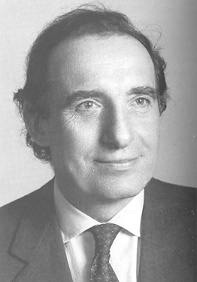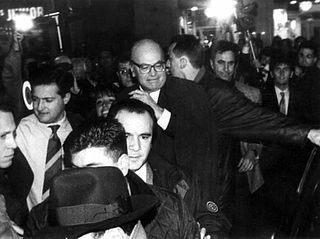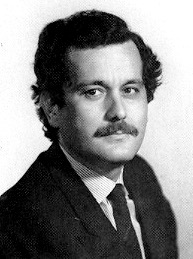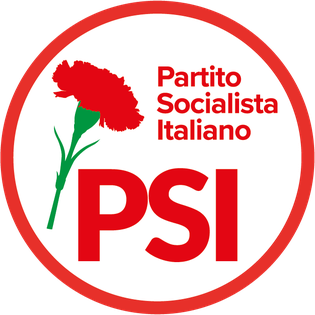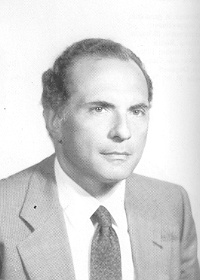Early life and education
Pillitteri was born in Sesto Calende, in the province of Varese; he had Sicilian origins. His father was a marshal of the Carabinieri and a monarchist but was active in the Italian Resistance, while his mother Zelia was from Valtellina. [1] The young Pillitteri studied at the Salesians of Sondrio. He attended the Berchet High School in Milan, where he met his future wife. He recalled that "the first time I saw Milan was in 1946, I had recently moved with my family from Valtellina, we were displaced in Porta Vittoria. My father took me on a bicycle to visit the city. I was deeply affected by the houses torn apart by the bombs. I just couldn't recognize the Milan of my father's stories among that rubble, and when I saw the destroyed Gallery I burst into tears: as if a dream I had been pursuing for years had been lost forever. My father told me: 'don't worry, very soon everything will be rebuilt'. And so it was. For Milan it is still this: a great ability to never give up, to adapt to the new, the will to adapt and change." [1]
Pillitteri was one of the young people who walked seventy kilometers in England in one of the peace marches promoted by Bertrand Russell. He recalled that "the first of these marches was spontaneous, I remember that Guido Piovene was also there, only later, when there started to appear the party flags, I no longer participated." [1] He graduated in literature at the University of Milan and became a journalist. [2] From his university years, his passion for cinema also manifested itself. He was president of the Milan University Film Centre. Having completed his studies, Pillitteri began his activity as a journalist and film critic, and collaborated with Avanti! , Mondoperaio , and Critica Sociale . [1]
Career
After having worked as a journalist, film critic, and cultural animator (he created one of the first film clubs in Milan), Pillitteri began his political career within the PSI. The PSI–PSDI's unification led to the establishment of the PSU. Following a split in 1969, he joined the PSDI and in 1970 became part of the Milan councilor for culture. During his mandate, the city went through a moment of great artistic and cultural vivacity. Among the exhibitions held in those years there was the one dedicated to nouveau realism, which culminated with Christo's installations in Piazza del Duomo in Milan. Ten years after its foundation, Pillitteri, Pierre Restany, and Guido Le Noci organized a festival to celebrate its tenth anniversary of its birth. [3]
In 1975, with the PSI's autonomist turn looming, Pillitteri founded the Unitary Movement of Socialist Initiative, which merged into the PSI on the threshold of the "revolution of the forty-year-olds" that in July 1976 brought Bettino Craxi to the party secretariat. As councilor with responsibility for private construction, he developed the general master plan of Milan. He was an uninterrupted member of the municipal council for over a decade until 1980, also holding the position of councilor with responsibility for the budget. Following his appointment as regional secretary of the PSI, he was elected deputy in the 1983 Italian general election, remaining in this position for eleven years until 1994. [4] [5] [6]
Pillitteri became mayor of Milan, succeeding fellow PSI member Carlo Tognoli on 21 December 1986, at the helm of a municipal council that saw the political alliance with Christian Democracy (DC), following the coalition of the Pentapartito . In 1987, following disagreements with the DC, an unprecedented red–red–green coalition was launched by the PSI with the Italian Communist Party and the Federation of the Greens. In the 1990 Italian local elections, he achieved significant personal success as the PSI achieved 20 percent of the votes in Milan. He later recalled that in the 1980s Milan was a capital city, where the likes of Mikhail Gorbachev, the 14th Dalai Lama, and future King Charles III came to the city. [7] Pillitteri was re-elected as a deputy in the 1992 Italian general election, the last of the First Italian Republic. During his time as a deputy, he was a member of the IV Commission for Defense, the VII Commission of Education, and XII Commission for Social Affairs. He also presented a total of 51 bills. [2]
In early May 1992, Pillitteri received, together with Tognoli, a warning for the crime of receiving stolen goods in relation to 500 million lire, as part of the Mani pulite investigation. He was definitively convicted of the crime, with a sentence set at 2 years and 6 months by the Court of Appeal of Milan in 1996. He was initially sentenced to 4 years and six months for receiving stolen goods and financing illegal to the parties, which means he would have gone to prison; his lawyers managed to reopen negotiations on the decree of execution of the sentence until it was reduced to three years, which was the limit that avoids prison time, and thus Pillitteri was sentenced to social services. According to the prosecution, he had collected 650 millions of bribes from executives from Aem, the municipal electricity company, another 100 million from Mario Chiesa, and 7 million from Matteo Carriera, the owner of IPAB, the charitable institute best known for the benefits offered to the general staff of the PSI. [8] Since then, he returned to his journalistic career; he also hosts programs on small broadcasters and is often a guest commentator. [1] In 2022, he called the Mani pulite investigative pool the Great Caesura, and said: "Since politics is a generic, elusive fact, to eliminate it they struck at its incarnation: the parties. With Tangentopoli, politics was mortally wounded: first they criminalized it and then, in a continuous process of devaluation, we arrived at today's indistinct magma." [9]
Parallel to his twenty-five year political career within the PSI, Pillitteri collaborated with several important socialist newspapers, such as Avanti!, and was also co-director of the newspaper L'Opinione delle Libertà. [7] He was a professor of film history at the IULM University of Milan and a prolific author of books and essays concerning cinema and political activity, [10] including among others Anna Kuliscioff (1986), Maestri Autori Eventi (1986), Fra suspense e psicanalisi. Il cinema di Alfred Hitchcock (1991), Un cuore grande così: Edmondo De Amicis (1989), Cinema come politica (1992), Io li conoscevo bene (1994), La Baracca di Fellini (1995), Il cinema tra fiction e falsità. Simili, facsimili, quasi falsi, falsi storici. Quando il cinema all'italiana manipola la nostra storia (2000) Evìto. Dos pesos y dos misuras (2002) Quando Benedetto divenne Bettino (2007) Non è vero ma ci credo. Immagini, simulacri, inganni (2009), and Luca Comerio. Milanese. Fotografo, pioniere e padre del cinema italiano (2011), [11] and Tutto poteva accadere (2015). [12] As of 2022, Pillitteri was head of the press office of MM, the Milan metro company. [9]
